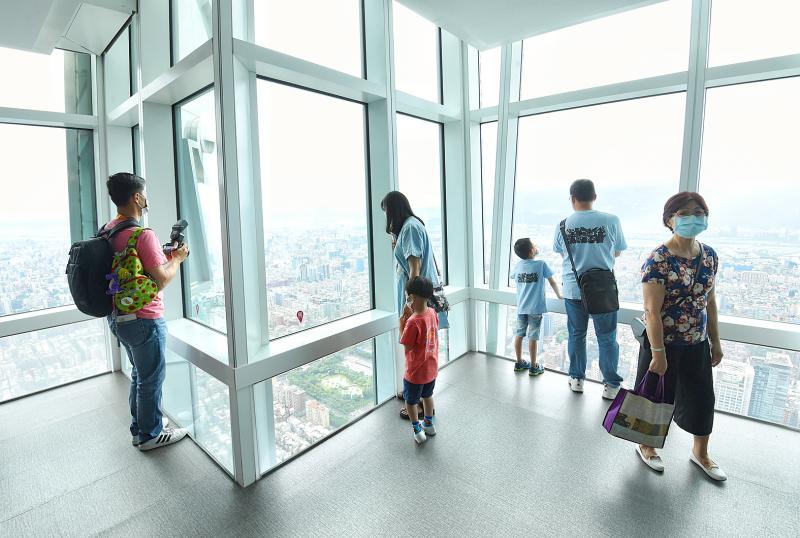The indoor observatory on the top floor of Taipei 101 has been opened to the public on a trial basis, while the cost of visiting the outdoor area has been reduced, Taipei Financial Center Corp (台北金融大樓) said yesterday.
The regular NT$300 ticket for the observatory on the 89th floor now allows visits to the indoor observatory on the 101st floor, Taipei Financial Center said.
Prior to yesterday, only “very, very important persons,” such as visiting heads of state, foreign celebrities and prime customers of Taipei 101’s shopping mall, were allowed access to the indoor observatory on the 101st floor, it said.

Photo: Fang Pin-chao, Taipei Times
Tickets for public visits to the outdoor area on the 101st floor, which previously cost NT$2,700 per person on weekends or NT$3,000 for two people on weekdays, have been sharply reduced, it said.
Visitors to the 89th floor observatory would need to pay an additional NT$999 to go up to Skyline 460, as the outdoor area on the top floor is called, the company said.
The new prices and public access are being implemented on a trial basis for this month, with visits to the top floor limited to 200 people per hour, because a special elevator is required to reach it, Taipei Financial Center said.
After the trial period, the cost to visit the indoor and outdoor areas of the top floor observatory would increase by NT$101, it said.

South Korea’s equity benchmark yesterday crossed a new milestone just a month after surpassing the once-unthinkable 5,000 mark as surging global memory demand powers the country’s biggest chipmakers. The KOSPI advanced as much as 2.6 percent to a record 6,123, with Samsung Electronics Co and SK Hynix Inc each gaining more than 2 percent. With the benchmark now up 45 percent this year, South Korea’s stock market capitalization has also moved past France’s, following last month’s overtaking of Germany’s. Long overlooked by foreign funds, despite being undervalued, South Korean stocks have now emerged as clear winners in the global market. The so-called “artificial intelligence

NEW IDENTITY: Known for its software, India has expanded into hardware, with its semiconductor industry growing from US$38bn in 2023 to US$45bn to US$50bn India on Saturday inaugurated its first semiconductor assembly and test facility, a milestone in the government’s push to reduce dependence on foreign chipmakers and stake a claim in a sector dominated by China. Indian Prime Minister Narendra Modi opened US firm Micron Technology Inc’s semiconductor assembly, test and packaging unit in his home state of Gujarat, hailing the “dawn of a new era” for India’s technology ambitions. “When young Indians look back in the future, they will see this decade as the turning point in our tech future,” Modi told the event, which was broadcast on his YouTube channel. The plant would convert

‘SEISMIC SHIFT’: The researcher forecast there would be about 1.1 billion mobile shipments this year, down from 1.26 billion the prior year and erasing years of gains The global smartphone market is expected to contract 12.9 percent this year due to the unprecedented memorychip shortage, marking “a crisis like no other,” researcher International Data Corp (IDC) said. The new forecast, a dramatic revision down from earlier estimates, gives the latest accounting of the ongoing memory crunch that is affecting every corner of the electronics industry. The demand for advanced memory to power artificial intelligence (AI) tasks has drained global supply until well into next year and jeopardizes the business model of many smartphone makers. IDC forecast about 1.1 billion mobile shipments this year, down from 1.26 billion the prior

People stand in a Pokemon store in Tokyo on Thursday. One of the world highest-grossing franchises is celebrated its 30th anniversary yesterday.